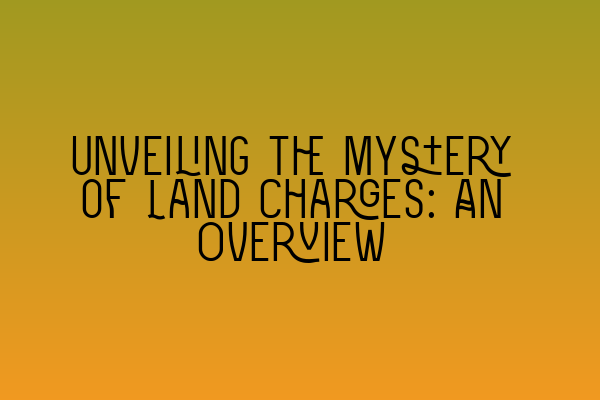Unveiling the Mystery of Land Charges: An Overview
As property solicitors, understanding land charges is crucial in any conveyancing transaction. Land charges are legal charges or restrictions that can be registered against a property, impacting its ownership and use. They often remain hidden, waiting to be discovered during property searches, which is why it’s essential to have a comprehensive understanding of them.
In this article, we will delve into the world of land charges, shedding light on their types, registration process, and the implications they have on property transactions. So, let’s get started!
Types of Land Charges
There are various types of land charges that can affect a property, each serving a different purpose. The most common ones include:
1. Class C (iv) Land Charges: These charges are primarily bankruptcy-related and represent an interest or claim against the property by a bankrupt individual or their trustee. They can restrict the sale or transfer of the property, as the trustee may seek to recover funds to satisfy the bankrupt’s debts.
2. Class D Land Charges: This category encompasses various charges, including local land charges, drainage rates, and maintenance liabilities, among others. Local land charges are crucial as they provide information about planning permissions, tree preservation orders, and conservation areas. Drainage rates and maintenance liabilities, on the other hand, relate to utilities and services provided to the property by local authorities or other organizations.
3. Crown Charges: These charges stem from debts owed to the Crown, such as unpaid taxes or fines. They are registered against the property and can have serious implications if not addressed before a transaction.
4. Official Search with Priority: A search is conducted at the Land Charges Department to determine if any relevant charges are registered against the property. This search offers protection to buyers by ensuring they receive unencumbered title to the property.
Registration of Land Charges
To be enforceable, land charges must be registered in the appropriate registry or department. The registration process varies depending on the type of charge. Here are a few examples:
1. Bankruptcy-related charges: Bankruptcy restrictions and dispositions are typically registered with the Land Charges Department, ensuring their visibility to potential buyers. It’s crucial to conduct thorough bankruptcy searches to uncover any hidden charges that may adversely affect a transaction.
2. Local land charges: Local land charges, such as planning restrictions or conservation area designations, are registered with the local authority. Property solicitors must conduct comprehensive searches to reveal any potential limitations on the property’s use or development.
Implications on Property Transactions
Land charges can have significant implications on property transactions, influencing decisions made by both buyers and sellers. Here are some key points to consider:
1. Disclosures: Sellers must disclose any known land charges and restrictions to potential buyers. Failure to disclose such information can lead to legal complications after completion. Property solicitors play a crucial role in ensuring the completeness and accuracy of these disclosures.
2. Mortgage Lender Approval: Lenders will assess the impact of land charges on the property’s value and marketability before approving a mortgage. Failure to address these charges may result in a mortgage application being declined.
3. Property Searches: Proper property searches, including bankruptcy and local land charge searches, are vital to identify any hidden land charges. These searches provide crucial information for buyers to make informed decisions about a property.
4. Property Use Restrictions: Land charges can restrict the use of a property, such as limitations on alterations, extensions, or even occupation. Property solicitors must ensure these restrictions are considered and communicated effectively to clients during the conveyancing process.
Conclusion
Understanding land charges is fundamental for property solicitors involved in conveyancing transactions. By comprehending the different types of land charges, the registration process, and the implications they have on property transactions, solicitors can guide clients and ensure a smooth and successful transaction.
If you want to gain a deeper understanding of property law and land law principles, consider enrolling in SQE 1 and SQE 2 preparation courses. These courses provide comprehensive training for aspiring solicitors and ensure you are well-prepared for the SRA SQE exams. Additionally, you can test your knowledge with SQE 1 practice exam questions and SQE 1 practice mocks FLK1 FLK2 to assess your readiness for the exams.
For more information about SQE exam dates and preparation courses, visit SQE 1 and SQE 2 preparation courses and SRA SQE exam dates.
Remember, knowledge is power, and when it comes to land charges, being well-informed is crucial for a successful property transaction.
